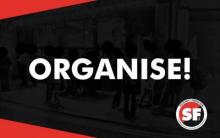Sites linked to the Solidarity Federation
www.solfed.org.uk
Solidarity Federation - the website of the national federation.
Catalyst
Freesheet of the Solidarity Federation - contact us if you want a copy, or if you want to distro where you are.
Direct Action
Quarterly magazine of the Solidarity Federation.
Liverpool SolFed
The Solidarity Federation local branch in Liverpool.
Manchester SolFed
The Solidarity Federation local branch in Manchester.
WYSF
The Solidarity Federation local branch in West Yorkshire.
SLSF
The Solidarity Federation local branch in South London.
SelfEd
Self education course on the history of the working-class movement, produced by SF.
Education Worker Network
An industrial network of SF members working in the education sector.
International Workers Association (IWA-AIT)
The Solidarity Federation is a member section of the International Workers Association (IWA-AIT)
Anarchist and other groups
Anarchist Federation
Class struggle anarchists (based in Britain and Ireland) aiming to abolish Capitalism and all oppression to create a free and equal society - Anarchist Communism.
Organise!
Anarchist group active mainly in Belfast, publish the amazing quarterly tabloid paper
The Leveller. More of their stuff is available on
libcom.org.
Yorkshire Anarchist Federation
Collective anarchist groups based in Sheffield, Leeds and Hull affiliated to the Anarchist Federation.
AF North
Website run by he Manchester Group of the Anarchist Federation, also had archives of the libertarian socialist group Solidarity and the council communist groups Subversion and Wildcat.
Glasgow Anarchists
Umbrella group of anarchists in Glasgow, were involved in school occupations in summer 2009.
South Wales Anarchists
Network of autonomous collectives against all forms of exploitation and bigotry, and with a nie website. Also publish Gagged!.
Haringey Solidarity Group
Local group that started life as anti-poll tax group and still believes ordinary people know what's best for them, not bosses or politicians.
The Commune
London based group who believe that "communism can only come from below, through the organisations of the workers themselves", after several member rejected state socialist parties.
The Sparrows' Nest
Centre for Anarchist Culture and Education in Nottingham set up by Notts Afed and other anarchists to inform about anarchism and about working class struggles in the region.
Activism in Brighton and Hove
Brighton Benefits Campaign
Campaign to defend against welfare cuts, and fight for higher levels of benefits.
Smash EDO
The campaign to get rid of Brighton-based weapons manufacturer EDO.
Brighton No Borders
Support for people threatened by Britain’s immigration laws.
Brighton Anarchist Black Cross (ABC)
Supports anarchist and other class struggle prisoners in the UK and elsewhere.
Stop the Cuts!
Campaign against budget cuts at Sussex university, because the university is for education and not profit.
Simon Jones Memorial Campaign
Campaigning for justice for Simon Jones and against casualisation.
Brighton Keep our NHS Public
Campaigning against the privatisation of local health services.
BrightonClimateChange.Org
Aims to tackle the global problem of climate change locally.
Anarchist Society
Student society discussing and organising anarchism at Sussex univeristy.
Local freesheets:
SchNEWS
The weekly anti-capitalist newsletter published in Brighton since 1994.
Rough Music
Brighton’s trouble makin’, dirt diggin’ bi-monthly(ish) newsletter.
Hereford Heckler
Hereford's favourite muck-spreading news-digger, published by the Hereford Solidarity League.
The Pork-bolter
Produced by and for ordinary residents of Worthing, named after an ancient nick-name for Worthing people dating back to fishing village days.
Hackney Heckler
Launched in October 09, this newsletter aims to be a focal point for resistance in Hackney.
The Fargate Speaker
Bi-monthly local bulletin of the Anarchist Federation in Sheffi eld.
The Leveller (Cambridge)
Free news-sheet produced by Cambridgeshire Anarchists focusing on the local issues and news.
W.A.G.
Freesheet published by the Whitechapel Anarchist Group
Bath Bomb
Monthly(ish) news sheet keeping people in Bath informed of all the local news, scandal and rioting.
Gagged!
Bi-monthly freesheet published by South Wales Anarchist.
National and international campaigns
National Shop Stewards Network
Rebuild the strength of the working-class movement from the bottom up by creating local, regional and national networks of elected reps and shop stewards.
London Coalition Against Poverty
Organisation based on the belief that through solidarity and direct action, ordinary people have the power to change our own lives.
Defend Council Housing
Campaign against privatisation of council housing and in favour of direct investment.
Labour Start
Collects and disseminates information about international trade union activism, and does online campaigning.
More about anarchosyndicalism and anarchism
libcom.org
Resource for all people who wish to fight to improve their lives, their communities and their working conditions run by libertarian communists. Their library has many thousands of entries, click
here for articles about anarcho-syndicalism.
The Anarcho-Syndicalist Thought of Rudolf Rocker
Site archiving the writings of the anarcho-syndicalist Rudolf Rocker (1873 - 1958)
Anarcho-Syndicalism 101
Web archive of theoretical and historical texts, articles, image and mp3 files, cultural items and outreach material related to libertarian class struggle.
An Anarchist FAQ
Promotes anarchist theory and ideas by answering frequently asked questions, such as
What is anarchism? and
What is anarchosyndicalism?.
Anarcho-syndicalism in Puerto Real From shipyard resistance to direct democracy and community control
Pamphlet on an example of contempary anarcho-syndicalism in the Spanish shipyard of Puerto Real (La Presa / Solidarity Federation, 1995).
A short history of British anarcho-syndicalism
The history of a tendency within the workers movement in Britain since the end of the 19th century. (SF pamphlet from 2006)
Strategy and Struggle: anarcho-syndicalism in the 21st century
The first version of our local's 2009 pamphlet on industrial strategy. It led to stimulating exhanges within SF and with other class struggle anarchists - a new version is in the works!

























